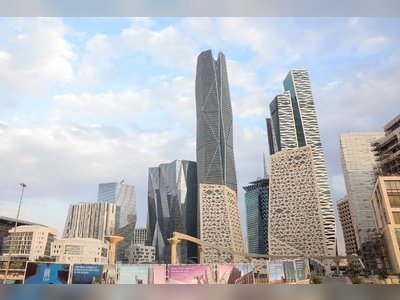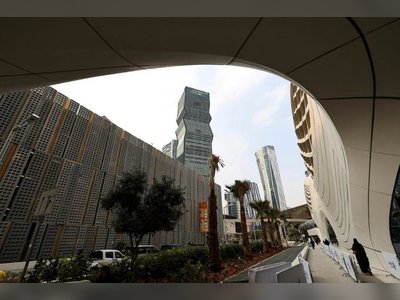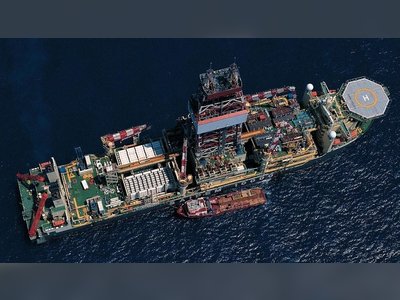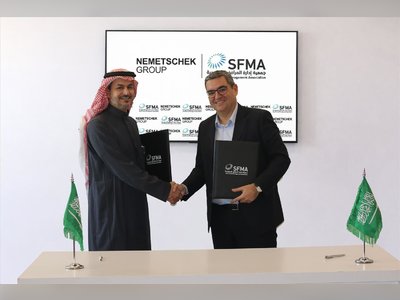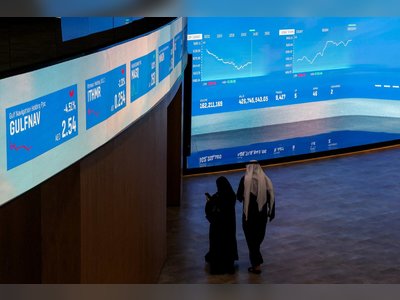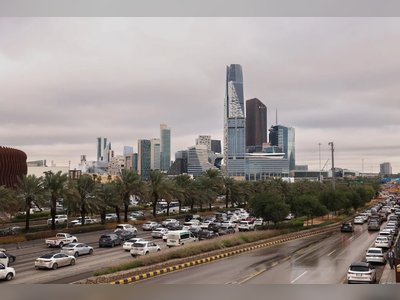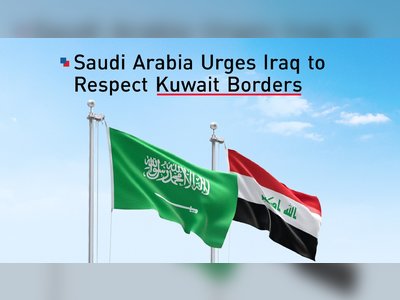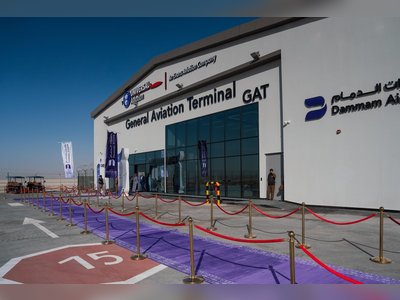
Saudi Arabia makes history as Barnawi and Al Qarni welcomed into International Space Station
Saudi astronauts Rayyanah Barnawi and Ali Al Qarni made history as they were welcomed into the International Space Station (ISS).
They were overwhelmed with joy and excitement when the door of the SpaceX capsule, carrying the astronauts, opened after its successful docking with the ISS.
Around two hours after docking, the four-member crew entered the station where they joined seven other astronauts who are already on board.
Addressing a welcome ceremony on the orbiting laboratory, Barnawi and Al Qarni expressed their delight over the remarkable feat.
Barnawi and Al Qarni thanked Custodian of the Two Holy Mosques King Salman and Crown Prince and Prime Minister Mohammed Bin Salman and all others who made their dreams come true.
They expressed their gratitude to the King and the Crown Prince for their support and trust reposed in them.
Barnawi could be seen wiping tears during her address. “We are extremely happy to be here, representing the hopes and dreams of everyone back home.
“This international collaboration shows how space brings all together and brings those with different backgrounds,” she said.
On his part, Al Qarni said: “I am really excited to work along with you and eager to learn from your expertise and share with you our own experiences.”
The duo made history as the first Saudi citizens to visit the orbiting outpost, while Barnawi has become the first Saudi and Arab woman in space and on the station.
Hundreds of thousands of Saudis followed the historic space voyage with immense pride and excitement.
About 16 hours after its launch, a SpaceX capsule, carrying four astronauts, docked with the ISS as part of a private mission chartered by Axiom Space.
“It was a lovely ride,” said mission commander Peggy Whitson, a former NASA astronaut who made the voyage three times in the past, adding: “It was the softest docking I’ve ever felt.”
The fourth crew member is American businessman John Shoffner.
About two hours after docking, the capsule’s hatch was opened to allow the four to enter the ISS, where they joined the seven astronauts already on board — three Russians, three Americans, and the UAE citizen Sultan Al-Neyadi.
The SpaceX rocket took off from Florida on Sunday, and the trip to the ISS, which flies around 400 kilometers above the earth, lasted about 16 hours.
This mission, named Ax-2, is the second fully private mission to visit the Space Station, following a first in April 2022. The members of Ax-2 will stay about eight days and carry out about 20 experiments.
The astronauts blasted off from the rocket aboard a SpaceX Dragon spacecraft from Launch Complex 39A at NASA's Kennedy Space Center, Cape Canaveral in the US state of Florida on Sunday. The launch of the private mission voyage to the ISS was at 1:37 a.m.
At the orbiting laboratory, the Axiom Space astronauts would carry out a full mission comprised of science, outreach and commercial activities.
During their mission, Barnawi and Al Qarni will conduct 20 experiments, including research into predicting and preventing cancer and a study into how to generate artificial rain in future human settlements on the Moon and Mars.
Their experiments would also focus on human research, cell sciences, and cloud seeding experiments in the microgravity environment.
Saudi Arabia’s involvement in the mission is also to expand space science education in the Kingdom. Saudi male and female students will participate in scientific experiments conducted on the ISS.
Saudi Arabia established the Saudi Space Commission in 2018 and launched a program last year to send astronauts into space.
The mission to the ISS will be the second in partnership with ISS-key holder NASA by Axiom Space, a private space company, which offers the rare voyages for sums that run into the millions of dollars.
It is noteworthy that the voyage of the Saudi astronauts comes within the framework of the Kingdom’s program for astronauts, which aims to qualify experienced Saudi cadres for space flights, and to participate in conducting scientific experiments, international research and future missions related to the space sector.
Around two hours after docking, the four-member crew entered the station where they joined seven other astronauts who are already on board.
Addressing a welcome ceremony on the orbiting laboratory, Barnawi and Al Qarni expressed their delight over the remarkable feat.
Barnawi and Al Qarni thanked Custodian of the Two Holy Mosques King Salman and Crown Prince and Prime Minister Mohammed Bin Salman and all others who made their dreams come true.
They expressed their gratitude to the King and the Crown Prince for their support and trust reposed in them.
Barnawi could be seen wiping tears during her address. “We are extremely happy to be here, representing the hopes and dreams of everyone back home.
“This international collaboration shows how space brings all together and brings those with different backgrounds,” she said.
On his part, Al Qarni said: “I am really excited to work along with you and eager to learn from your expertise and share with you our own experiences.”
The duo made history as the first Saudi citizens to visit the orbiting outpost, while Barnawi has become the first Saudi and Arab woman in space and on the station.
Hundreds of thousands of Saudis followed the historic space voyage with immense pride and excitement.
About 16 hours after its launch, a SpaceX capsule, carrying four astronauts, docked with the ISS as part of a private mission chartered by Axiom Space.
“It was a lovely ride,” said mission commander Peggy Whitson, a former NASA astronaut who made the voyage three times in the past, adding: “It was the softest docking I’ve ever felt.”
The fourth crew member is American businessman John Shoffner.
About two hours after docking, the capsule’s hatch was opened to allow the four to enter the ISS, where they joined the seven astronauts already on board — three Russians, three Americans, and the UAE citizen Sultan Al-Neyadi.
The SpaceX rocket took off from Florida on Sunday, and the trip to the ISS, which flies around 400 kilometers above the earth, lasted about 16 hours.
This mission, named Ax-2, is the second fully private mission to visit the Space Station, following a first in April 2022. The members of Ax-2 will stay about eight days and carry out about 20 experiments.
The astronauts blasted off from the rocket aboard a SpaceX Dragon spacecraft from Launch Complex 39A at NASA's Kennedy Space Center, Cape Canaveral in the US state of Florida on Sunday. The launch of the private mission voyage to the ISS was at 1:37 a.m.
At the orbiting laboratory, the Axiom Space astronauts would carry out a full mission comprised of science, outreach and commercial activities.
During their mission, Barnawi and Al Qarni will conduct 20 experiments, including research into predicting and preventing cancer and a study into how to generate artificial rain in future human settlements on the Moon and Mars.
Their experiments would also focus on human research, cell sciences, and cloud seeding experiments in the microgravity environment.
Saudi Arabia’s involvement in the mission is also to expand space science education in the Kingdom. Saudi male and female students will participate in scientific experiments conducted on the ISS.
Saudi Arabia established the Saudi Space Commission in 2018 and launched a program last year to send astronauts into space.
The mission to the ISS will be the second in partnership with ISS-key holder NASA by Axiom Space, a private space company, which offers the rare voyages for sums that run into the millions of dollars.
It is noteworthy that the voyage of the Saudi astronauts comes within the framework of the Kingdom’s program for astronauts, which aims to qualify experienced Saudi cadres for space flights, and to participate in conducting scientific experiments, international research and future missions related to the space sector.

